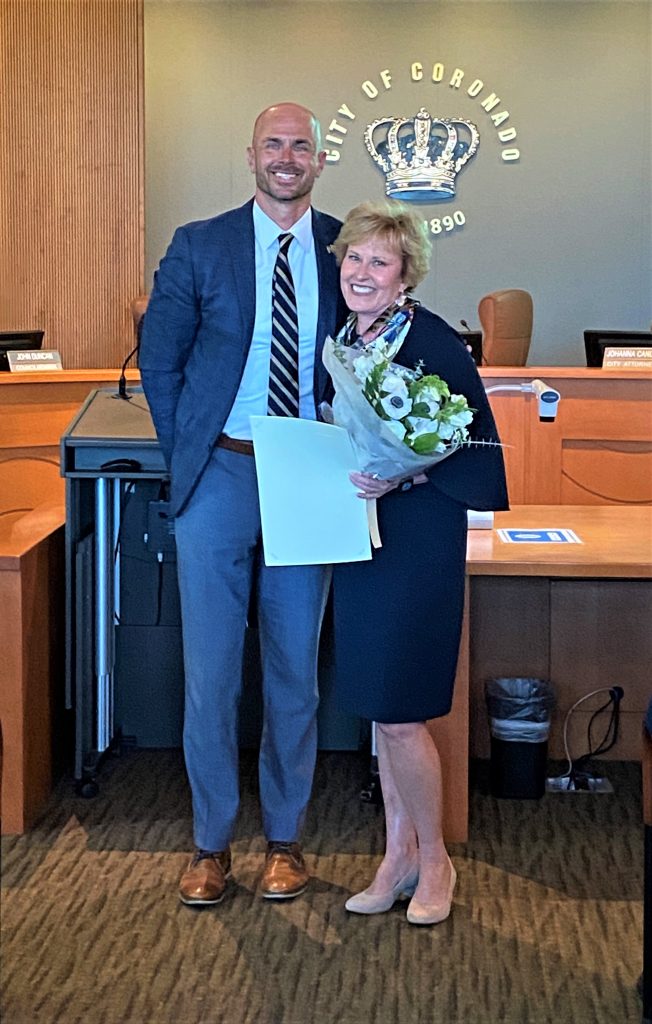 The council chamber for the Coronado City Council February 7 meeting was full of supporters as former CEO of Sharp Coronado Hospital Susan Stone, PhD, RN, was honored for her outstanding leadership and professional commitment to transforming, improving, and delivering award-winning medical care to the community for more than 15 years. Mayor Richard Bailey presented her with a plaque and flowers, highlighting her achievements, which are numerous; a few include implementing patient-centered care which has been recognized worldwide; quickly establishing the Coronado Covid-19 Community Clinic and implementing innovative solutions to treat patients; working with the Coronado Hospital Foundation on medical campus expansions and upgrades like the Mindful Healing Garden, ICU and Emergency Room expansions, seismic upgrades and acquiring state-of-the art robotic technology. She also established a partnership with Balboa Naval Medical Center, as well as many other community contributions. Stone will now be taking on the role of the Senior Vice President of Health System Operations and Chief Nursing Executive for Sharp HealthCare.
The council chamber for the Coronado City Council February 7 meeting was full of supporters as former CEO of Sharp Coronado Hospital Susan Stone, PhD, RN, was honored for her outstanding leadership and professional commitment to transforming, improving, and delivering award-winning medical care to the community for more than 15 years. Mayor Richard Bailey presented her with a plaque and flowers, highlighting her achievements, which are numerous; a few include implementing patient-centered care which has been recognized worldwide; quickly establishing the Coronado Covid-19 Community Clinic and implementing innovative solutions to treat patients; working with the Coronado Hospital Foundation on medical campus expansions and upgrades like the Mindful Healing Garden, ICU and Emergency Room expansions, seismic upgrades and acquiring state-of-the art robotic technology. She also established a partnership with Balboa Naval Medical Center, as well as many other community contributions. Stone will now be taking on the role of the Senior Vice President of Health System Operations and Chief Nursing Executive for Sharp HealthCare.
During Oral Communications, Emerald Keepers President Amy Steward asked the council to support several items on the Climate Action Plan. She shared that they had conducted a survey and had 300 respondees support the concept of a mini shuttle (Oz Mini Shuttle response), citing that the top reason to use it would be to visit the Orange Avenue businesses to avoid parking issues. She said that this type of shuttle operates in 30 other cities, including San Diego, Chula Vista, and National City, to name a few. She also advocated for Coronado to join a Community Choice Aggregation (CCA) for clean power, mentioning that quite a few cities in the county have joined.
Associate Planner Tricia Olsen gave an overview of the request for a Historic Alteration Permit for the home at 1402 8th Street. The comprehensive project proposal includes rear porch demo, additions on first floor of 95 square feet, and on the second floor of 96 square feet, the addition of a 1,780 square foot basement, which follows the existing footprint, new rear porch, wrap around deck on the east side, some restoration and replacement of needed wood window and door replacements, roof replacement, remove and restore siding and chimney bricks, retrofit and remodel existing garage.
Olsen pointed out that there is an exception request for the Floor Area Ratio (FAR) because the basement square footage counts in this because the floor is 8 ½ inches higher. Architect Kevin Rugee said that they looked at lowering the floor to prevent this exception, but felt it was not the most viable option in a historic home. It was noted that there will be no increase in the home’s height and most of the existing windows will be maintained. There was concern by Councilmember Downey about an external staircase, to which Rugee said it would be below grade on 8th Avenue and concealed by landscaping. The garage is currently designated as living space and will be converted back to parking.
During public comment CHA President Dave Landon said that the CHA was in support of this project. Homeowner Peggy Duncan noted that the additional square footage would be advantageous for their large family, and that they have a history of maintaining historic homes. Councilmember Donovan said that giving the 8 ½ inch height waiver for the FAR differential was worth maintaining the historic view of the home. With an approval recommendation from the Historic Resource Commission and city staff, the council unanimously approved this item, with Councilmember John Duncan recused because he owns the property.
 Proposed administrative changes to the Community Grant Program were presented by Management Analyst Kelli Maples, which led to two motions approved by council. The program began in 2000, and in 2019 Policy 28 guidelines were adopted, which are reviewed annually. A breakdown of the funding request in 2022 is as follows: 29 organizations requested grants with 45 applications, for a total amount of $1,575,110. The number of organizations that received grants was 24, with 38 applications totaling the current cap of $1 million.
Proposed administrative changes to the Community Grant Program were presented by Management Analyst Kelli Maples, which led to two motions approved by council. The program began in 2000, and in 2019 Policy 28 guidelines were adopted, which are reviewed annually. A breakdown of the funding request in 2022 is as follows: 29 organizations requested grants with 45 applications, for a total amount of $1,575,110. The number of organizations that received grants was 24, with 38 applications totaling the current cap of $1 million.
Maples outlined the three administrative changes and four policy alternatives proposed by staff. The first administrative change is to remove incremental disbursement requirement for grant agreements over $50,000 (currently, they are dispersed in July and January). Staff also recommended that all the grants be dispensed in July to improve cash flow for organizations, ease administrative burden, and better serve organizations with one-time time or annual events. The second administrative change involves removing the mid-year reporting requirement for grant agreements over $50,000 and just report annually. The third administrative change is to change the recurring event/activity and services grant types. This helps ensure funds weren’t used only for salaries and administrative purposes.
For policy changes, staff recommended establishing a funding cap of $100,000 per organization and $75,000 per program. Current policy includes a one-time funding of $150,000. Maples noted that the average request per organization is $54,314, with an average program request of $35,002, but five organizations submitted requests that totaled 75 percent of total available funding. Currently, organizations can submit an unlimited number of requests. Staff is proposing limiting that number to three applications per organization. In 2022, the average was well below at 1.55, but the maximum was seven. This would encourage organizations to be more innovative and increase the diversity of proposals.
Policy change number three involves allocating 10 percent ($100,000) of grant funding to organizations located outside of Coronado or serving outside communities. FOCUS President Pat Robitaille pointed out that their organization is based in Coronado with mainly Coronado members, and they assist organizations that help children in both San Diego and Coronado. The final policy change is to revise the minimum application score from 70 to 75 percent in the field reader review process. This upholds the high standards of projects with the city council still having final authority to allocate funding.
There was discussion among the council about keeping the $1 million cap, which is slated to change to one percent of the general fund budget total by 2035. When Mayor Bailey asked what one percent of the budget would have been last year, Maples noted that the general fund revenue was $66 million, which would have only netted an additional $23,000 percentage wise. During public comment CHA President Dave Landon pointed out that the $1 million cap set in 2018 should be increased to mirror inflation, as organizations are experiencing increased costs. The council unanimously approved a motion to change the $1 million community grant cap and tie it to one percent of the general fund revenue budget.
Councilmember Donovan commented, “We need to focus grants on organizations that positively affect the community.” The council unanimously approved the administrative and policy changes, with Councilmember Downey voting no in regard to changing the minimum application score. The 2023-24 Community Grant applications are available now at https://ca-coronado.civicplus.com/209/Community-Grant-Program-FY-2023-24.
City Manager Tina Friend gave a report on the February 2nd county-wide desk-top simulated emergency drill. She noted that was the first real-time exercise for many of the staff and many valuable lessons were learned, applauding staff for their seven hours of intensive training. Friend also noted that the Cottages at the Cays proposal is scheduled for the Port of San Diego Board agenda on February 14, and that the city has sent an opposition letter.
Approved on the Consent Calendar were a number of items including an annual street curb marking update which includes installing a red no parking curb zone and removal of a bus loading zone at 1107 Orange Avenue, a red no parking curb zone at 1207 Alameda Blvd., and reconfiguring red curb zones along Grande Caribe Causeway.
Out of three candidates, Jim Besikof was appointed to serve as a new member on the Mobility Commission for the remainder of a term expiring December 31, 2025.
Johanna Wilson was appointed to serve on the Cultural Arts Commission for the remainder of a three-year term expiring on December 31, 2025.
The Public Hearing for a special use permit and parking plan at 1199 Orange Avenue and valet program for 1301 and 1316 Orange Avenue were removed from the agenda and will be heard at a later meeting.
Noteworthy: When council members gave their committee reports, Councilmember Duncan shared that at a recent SANDAG meeting the smaller cities defeated a weighted vote for the first time. The mayor then noted that the weighted vote issue was previously scheduled as a SANDAG agenda item, but was postponed to the Board Retreat in March.
The next meeting of the city council is Tuesday, February 21.




